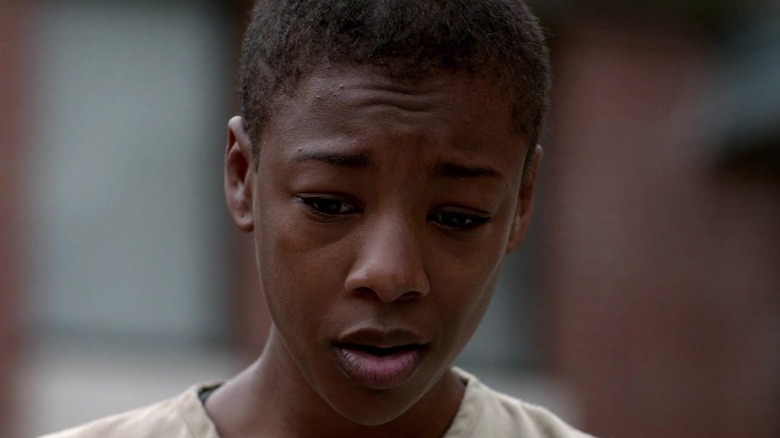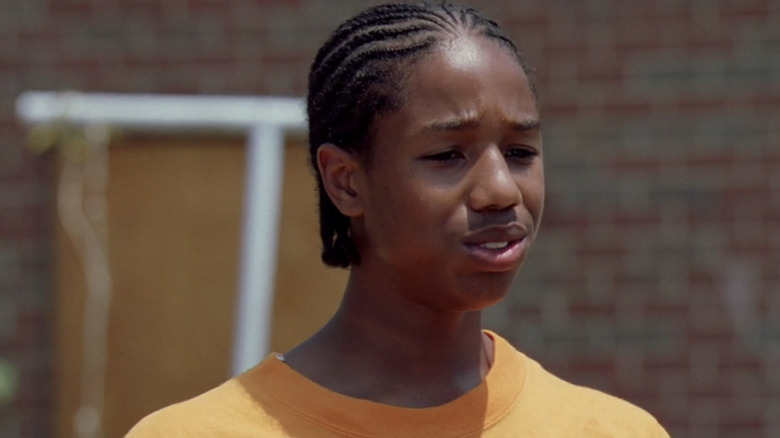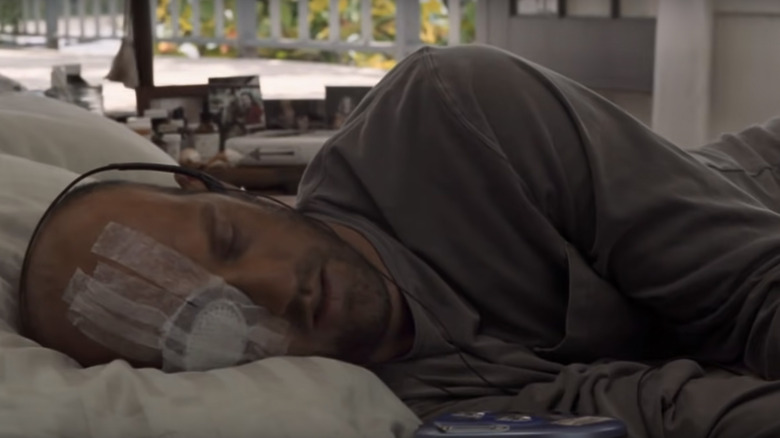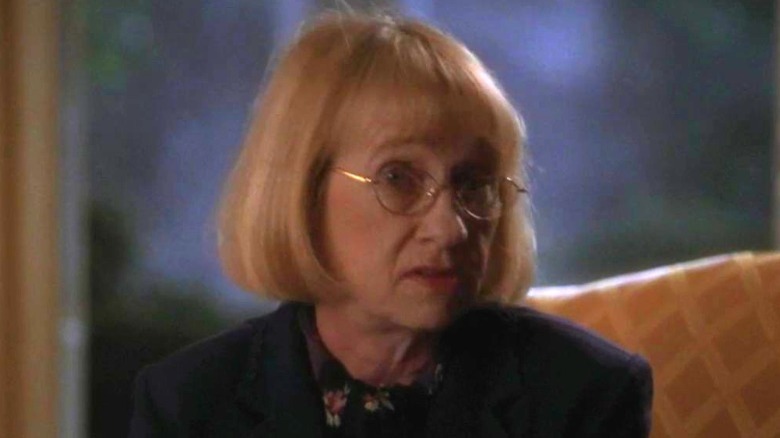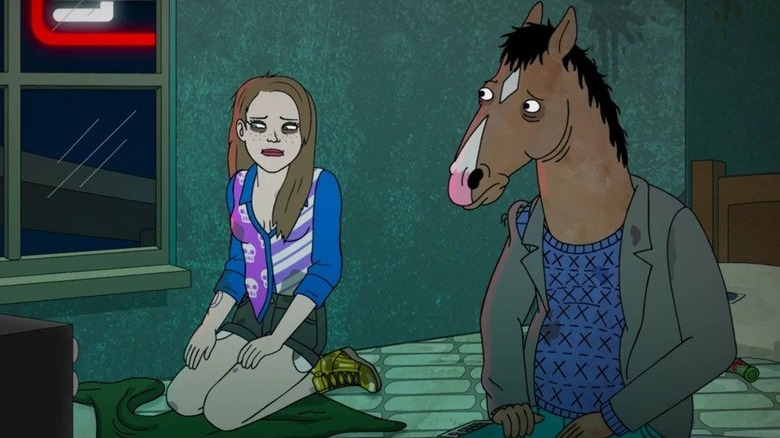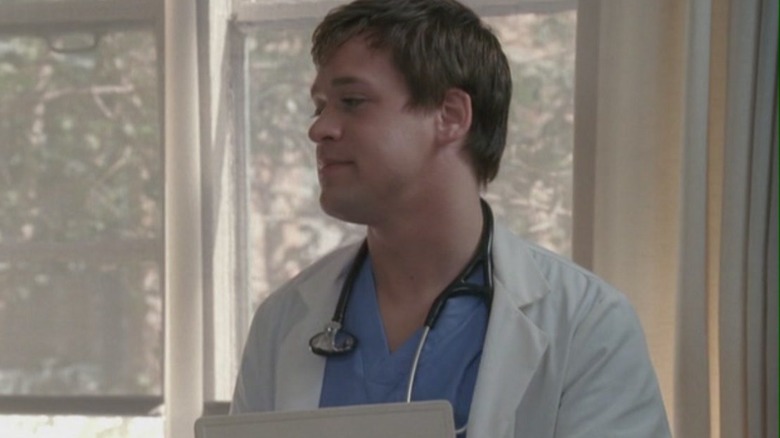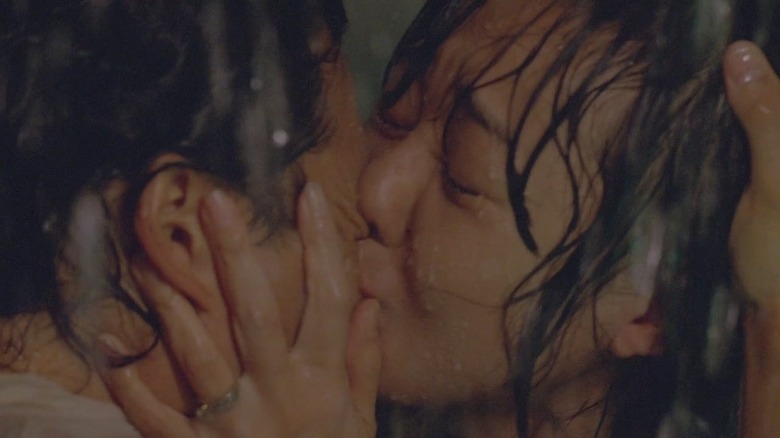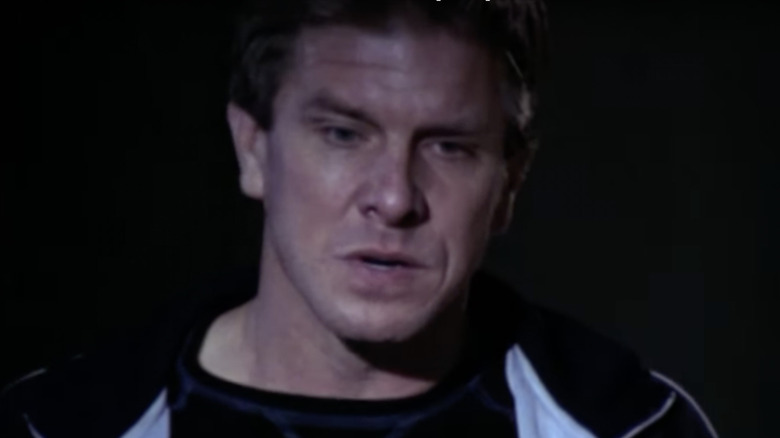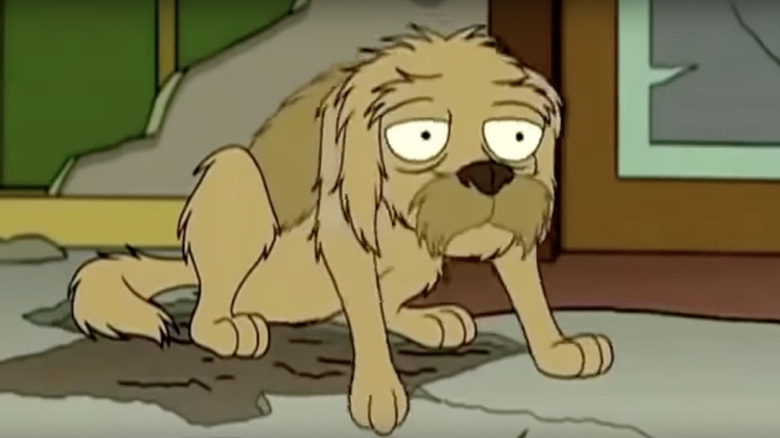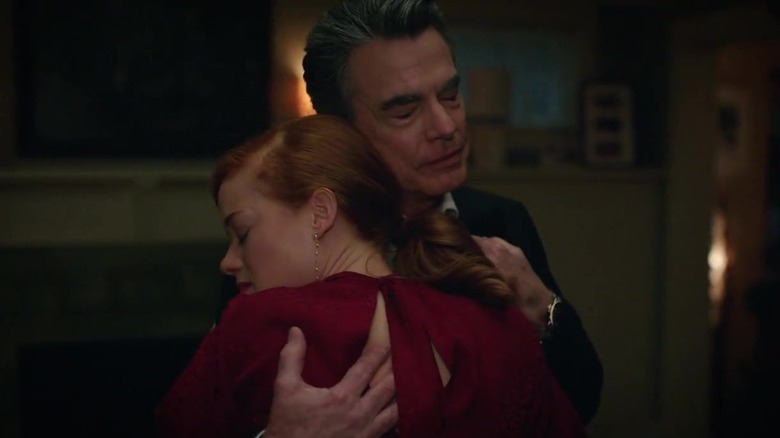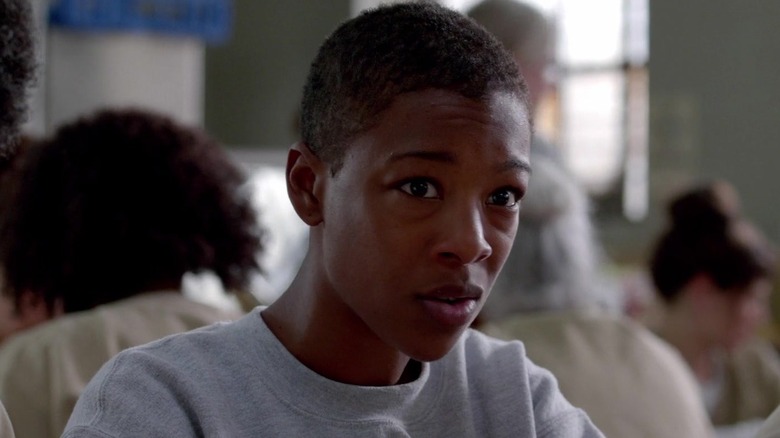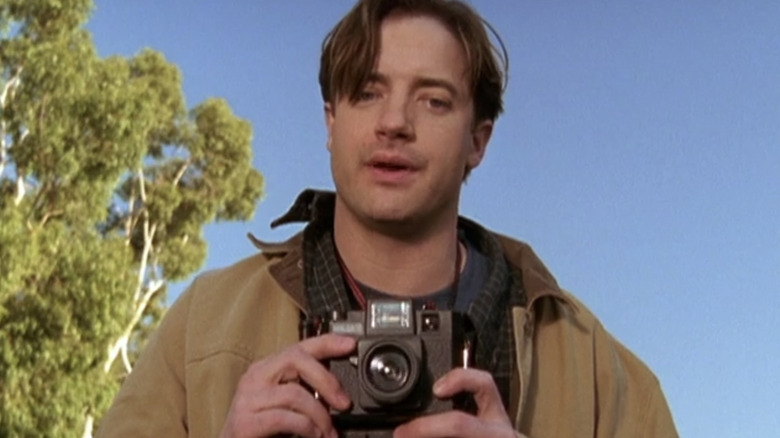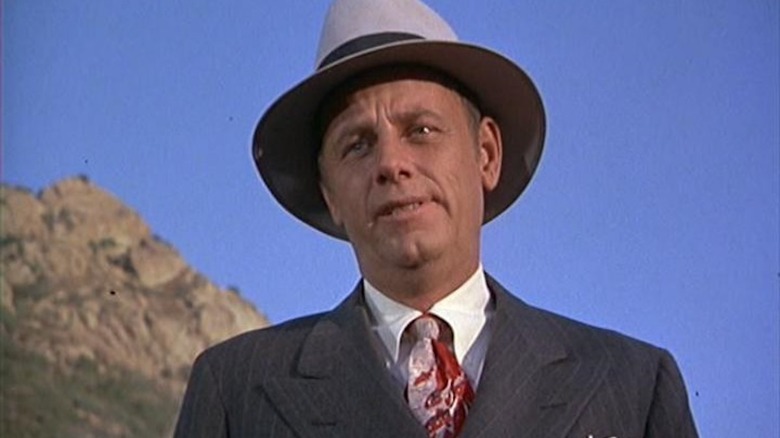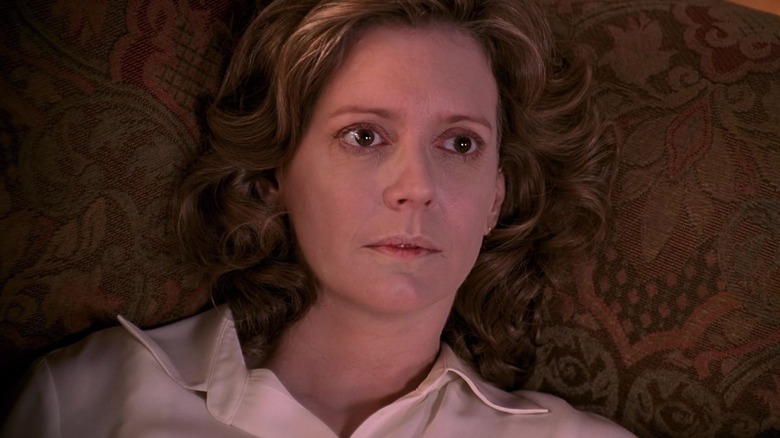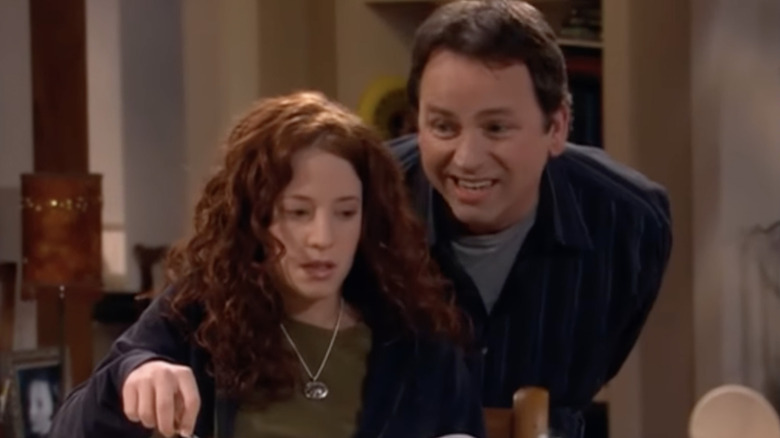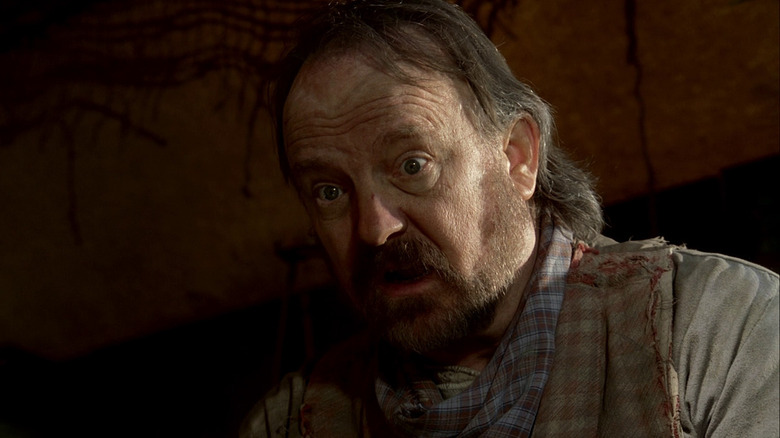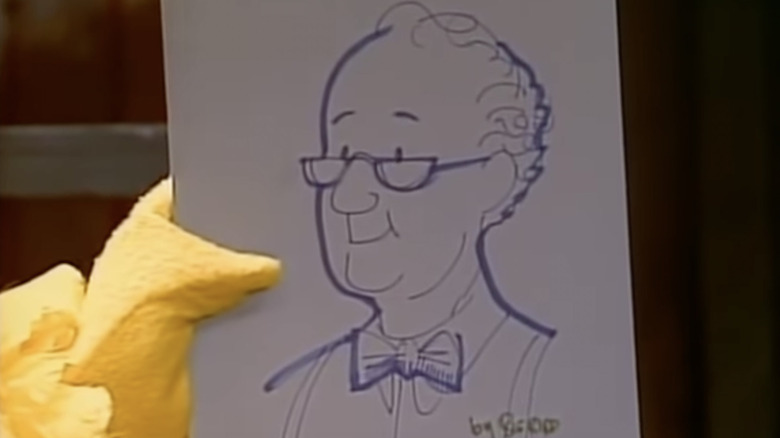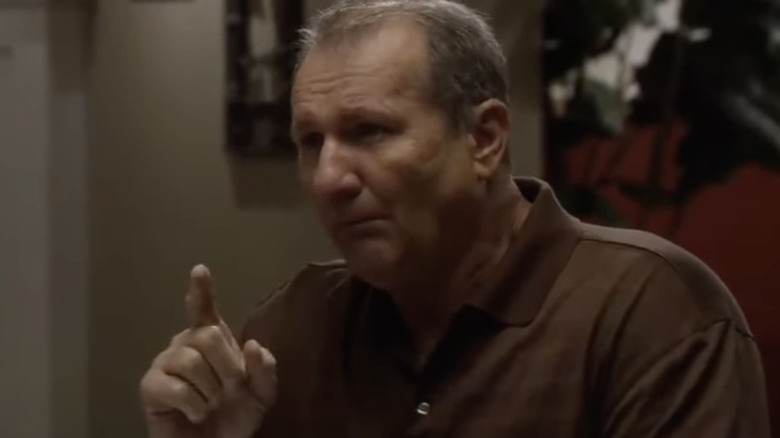The Saddest TV Character Deaths Of All Time
Spending episode after episode and season after season with TV characters can really help you get to know them. You're soaking up a lot of time in their fictional presence. It's great ... until the shows kill off the characters you've gotten so attached to.
If you've ever wound up completely dissolved in tears over a character's death, we completely sympathize. We've been there too. Sometimes the sadness doesn't even stem from spending years following the character's adventures, either: Occasionally, shows can introduce and then remove a character in a remarkably quick turnaround and still leave us sniffling. Maybe their death resonates too much with real life, or maybe it's just beautifully written and acted. These deaths can break our hearts for any number of reasons, but the end result is always the same. Can you pass us some tissues, please? We need them after thinking through our saddest TV character deaths of all time.
Wallace on The Wire
Fifteen-year-old Wallace on "The Wire" is used — and used up — by Avon Barksdale's crew, but he never has the ruthlessness or coldness he would need to advance in the ranks. Instead, he's sweet and caring, serving as a kind of surrogate older brother to the little kids in his neighborhood.
After Wallace tells the Barksdale crew where to find Brandon, rip-and-run artist Omar's boyfriend, he never really recovers from realizing that he set Brandon up for brutal torture and murder. After that, he wants out of the game, which means he's willing to cooperate with the cops ... and Stringer Bell knows it.
A young Michael B. Jordan is unforgettable as Wallace, especially in his heartbreaking final moments, tearfully facing the friends tasked with killing him. It's all more than enough for us to understand why his murder is what finally makes D'Angelo lash back at his bosses, repeatedly asking a question that can still make us cry: "Where's Wallace?"
Mark Greene on ER
For eight seasons, Mark Greene helped anchor "ER." When — per ABC — actor Anthony Edwards finally decided to step away from the role to spend more time with his family, the show already had a built-in exit for him: Mark's previous brain cancer diagnosis.
Season 7 of "ER" puts fans through a physical and emotional wringer, with Mark's brain tumor and bleak prognosis drawn out into a multi-episode arc. At first, the tumor is deemed inoperable, and it seems like a sure death sentence. The emotional rollercoaster finally stops when his surgery does go well, and the show then focuses on his recovery and subsequent personality changes. It feels like Mark is safely on the other side of his illness storyline ... and then his departure in Season 8 brings all of it back again. His actual sendoff is beautifully handled, and we certainly tear up at hearing "Somewhere Over the Rainbow," but the real sting here is the way Mark's remission gives us all false hope. It buys him time — but the clock still inevitably runs out.
Dolores Landingham on The West Wing
Kathryn Joosten's Mrs. Landingham has to qualify as one of the most beloved guest stars on "The West Wing." As President Bartlet's personal secretary — and a woman who's known him since he was a teenager — she's a funny and warm voice of wisdom. Even after her death, Bartlet calls upon one of his most treasured memories of her for clear-sighted and uncompromising advice about whether or not to run for another term: "If you don't want to run for a second term, I respect that. If you don't run because you think it's too hard, or you think you're going to lose, then God, Jed, I don't even want to know you."
When a drunk driver robs the "West Wing" characters of Mrs. Landingham, we feel almost as angry, devastated, and cheated as they do, and we can certainly understand how the one-two punch of her death and funeral leaves Jed Bartlet lambasting God in both English and Latin.
Sarah Lynn on BoJack Horseman
When "BoJack Horseman" starts, Sarah Lynn feels like an encapsulation of all the clichés of the grown-up child star. She deals with her early stardom by diving headfirst into promiscuity, drugs, and recklessness, and her trainwreck life is partly a parody. As the show goes on and the characters deepen, however, Sarah Lynn becomes a truly tragic figure, one who is mistreated and neglected by almost everyone in her life, and who just wants to hold onto whatever love and happiness she could still find.
Her long bender with BoJack in "That's Too Much, Man!" (Season 3, Episode 11) culminates with the two of them in the planetarium — where she dies of an overdose shortly after wistfully saying once more that she wants to be an architect. It's awful enough in the moment — BoJack's slow realization of her death is unforgettably painful — but it's even worse later on when we learn that BoJack might have been able to save her if he hadn't been trying to protect himself.
George O'Malley on Grey's Anatomy
T.R. Knight's George O'Malley can never really get his medical career together, but his fellow doctors on "Grey's Anatomy" are still alarmed by his sudden decision to pivot by enlisting in the Army. He's too gentle for the Army, and while nobody's saying it, he's never been the toughest guy around. Can't they talk him out of it?
They're swamped by other problems, though, including a seriously injured John Doe with grotesquely swollen facial features: He steps in front of an oncoming bus to push a girl out of the way, saving her life. He's a nameless hero until Meredith finally realizes what he's been trying to tell her all day. John Doe is George, their "007," the nickname given to him years ago on account of his early medical mishaps (he has a "license to kill"). He is braver than they know, but by the time they realize that, it's too late to say goodbye.
Jin-Soo and Sun-Hwa Kwan on Lost
Over the course of "Lost," major and minor characters exit the show in deaths that run the gamut from courageously self-sacrificing to surprising to inevitable. The one that leaves us completely dissolved in tears? The tragic death of married couple Jin and Sun.
"Lost" fans follow Jin and Sun through some of the most tumultuous days of their marriage. More than once, it seems like the two of them wouldn't be able to make things work — and sometimes it's even hard to believe that they should try. Jin's organized crime work drives a wedge between him and his wife, and at first, their time on the island only makes the split between them widen. Against all odds, however, the two of them pull together, developing a love story full of understanding and touching mutual loyalty — right up to the bitter end. With Sun trapped in a flooded submarine, Jin decides to stay with his wife rather than swim for safety as she wanted. They drown hand-in-hand, and we've never gotten over it.
Curtis Lemansky on The Shield
"The Shield" is full of morally compromised characters who make one bad choice after another, but the biggest mistake Kenny Johnson's Curtis "Lem" Lemansky makes is staying loyal to his corrupt team: For better or worse, they're his family. Instead of going on the run, he's prepared to go to prison to cover up the Strike Team's crimes, even though he's looking at a hard and dangerous sentence.
Unfortunately, Shane, his happy marriage with his pregnant wife and young son on the line, fears that Lem will eventually crack under all the new pressure. If he talks, their lives will come crashing down. An isolated meet-up and a stolen grenade let Shane take care of that possibility for good ... and it immediately fills him with grief-stricken self-loathing, leaving him sobbing apologies. It's a brutal gut-punch of a send-off for arguably the kindest character on the show, and it sets up all the additional tragedies that would follow.
Seymour on Futurama
We always get emotionally eviscerated watching animals die on-screen, especially when they're beloved pets. We'll probably never have it in us to make a list of TV's saddest pet deaths, but we'll suck it up to write about one of the most guaranteed tearjerkers of all time: Seymour in the "Futurama" episode "Jurassic Bark" (Season 4, Episode 7).
When Fry discovers his beloved dog fossilized in a 31st-century museum exhibit, he's determined to do his best to bring Seymour back — until he finds out that Seymour lived for 12 years after Fry was cryogenically frozen. It feels like a bittersweet victory when Fry makes himself accept that Seymour must have lived a full life without him and that he should accept that and leave him in peace. Fry gets closure.
Unfortunately, we then get it ripped away from us ... because it turns out that Seymour spent those 12 years obediently waiting on the sidewalk where Fry had left him, always hoping Fry would come back. Excuse us, we have something in our eyes.
Mitch Clarke on Zoey's Extraordinary Playlist
Zoey of "Zoey's Extraordinary Playlist" is shouldered with an unexpected gift: She can suddenly hear people singing popular songs that express their innermost thoughts. It transforms her life by giving her a new way to communicate with her dying father, Mitch (Peter Gallagher), whose illness has made it impossible for him to talk and (initially) hard for him to express himself at all. Over the course of the first season, Zoey's powers let her make her father's last days immeasurably better.
Inevitably, though, the end still has to come. After a few episodes in which Mitch is obviously declining, it's finally time to say goodbye. Zoey has a vision of him leading her through a sweet, tender dance to an instrumental take on "True Colors," and just like that, she's back at his bedside — and Mitch is gone. A whole season's worth of preparation for his death isn't enough to make his passing any less raw for his family, and it's not enough for us, either.
Poussey Washington on Orange Is the New Black
According to The New Yorker, Poussey's violent death on "Orange Is the New Black" caused an uproar with fans, some of whom saw it as an ill-considered and badly handled echo of the real-life deaths protested by Black Lives Matter — in reminding its viewers of the violence Black women can suffer, the show also took away one of the best Black female characters on TV.
It's not surprising that her death stirs up strong feelings: Viewers loved Samira Wiley's sweet, smart, funny, and optimistic Poussey. She can be a ray of sunshine in even the bleakest of environments, and she is right on the cusp of a brighter future, even having a job lined up on the outside, courtesy of beloved cooking show host (and fellow inmate) Judy King. For all of that to end so abruptly through brutal, inexpert force, in a mistake exacerbated by the same racism that would rush to cover it up — it's painful. For better or worse, it feels all too real, and that's what makes it so hard to take.
Ben Sullivan on Scrubs
In "Scrubs" Season 1, Brendan Fraser makes an instant impression as Ben, Dr. Cox's best friend and former brother-in-law who enjoys deliberately weirding people out. He is so delightful that it's easy to forget that he's only ever in three episodes: just enough time to get diagnosed with leukemia, be successfully treated for it, and then return two seasons later for a shocking death.
Ben's quintessential goofy adorableness is part of what makes his death so difficult, but the real pain comes from how "Scrubs" handled his departure. The show plunges the audience into Dr. Cox's denial, creating the illusion of Ben still being around. It's all cleverly done and gives the episode plenty of re-watch value, but our intellectual appreciation for it all can't compare to how floored we are when Dr. Cox, walking to what he thinks is his son's birthday party, finally lets himself understand that he's actually on the way to Ben's funeral. A note-perfect song choice — Joshua Radin's "Winter" — makes the moment hit even harder.
Lt. Col. Henry Blake on M*A*S*H
When "M*A*S*H" killed off Henry Blake (McLean Stevenson), it sent shockwaves through its audience. As "Watching M*A*S*H, Watching America" notes, shows of that era simply did not do tragic send-offs for their characters.
Until the last few minutes of the episode, Henry's departure goes smoothly and is played out with the series' signature blend of uproarious comedy and heartfelt emotion. Henry says his goodbyes — reserving an especially poignant moment for his loyal clerk, Radar — and leaves in a helicopter; the camp, of course, immediately has to deal with a new flood of wounded. Henry is gone, but the war is, unfortunately, business as usual. No one realizes that the war is about to hit much closer to home ... not until a dazed Radar comes in and reports the now-famous news: "I have a message: Lt. Col Henry Blake's plane was shot down over the Sea of Japan. It spun in. There were no survivors."
Everyone freezes up, both on- and off-screen. The scene where it all comes crashing down has become famous, especially with the way the circumstances force everyone to keep on working, regardless of the tears in their eyes.
Joyce Summers on Buffy the Vampire Slayer
Losing Kristine Sutherland's Joyce Summers to a brain tumor would always have been hard, but it might have been bearable if "Buffy the Vampire Slayer" hadn't handled the other characters' grief in such a realistic way.
Season 5, Episode 16's "The Body" shows Buffy, Dawn, and their friends devastated in the wake of the death of a woman who helped anchor them all to the normal world. It's an episode almost devoid of supernatural action, instead slowing down to look in detail at the mundane realities of a death in the family. Buffy has to call 911, and she's jolted by hearing the operator refer to her mother as "the body." To Willow, just the task of picking out something to wear to go see Buffy suddenly feels immense: How do you support a friend through something like this? In one particularly agonizing scene, the formerly immortal Anya tries to understand what death means, and her sense of confusion and tearful frustration feels universal. The episode remains one of TV's best treatments of grief.
Paul Hennessey on 8 Simple Rules
John Ritter was a comedy legend, and his unexpected death at only 54 left fans grieving. For the cast and crew of his ABC sitcom, "8 Simple Rules for Dating My Teenage Daughter," it also left them adrift.
The show decided to tackle Ritter's death head-on by having his character, the sweet (if often overprotective) Paul Hennessey, die as well. In the post-Ritter episodes, Paul's family also has to grapple with the sudden vacuum in their lives. It was an ambitious move for a comedy, but ABC believed that it was the best course of action. As chairman Lloyd Braun said (qtd. EW): "It may not be funny television, but it will be great television. Eventually, it will have to get funny again."
It did, even if it was never quite the same. What makes Paul's death so memorable and affecting, though, is watching his TV family work through some of the same grief their actors were feeling. It feels emotionally honest and at times even raw, and it was definitely the right decision.
Whitney Ellsworth on Deadwood
Even though it's easy to hear the mile-a-minute profanity on "Deadwood" (to say nothing of seeing all the bodies being fed to the pigs) and dismiss the whole show as morally bankrupt, the truth is that amid all the muck and violence is a lot of community-building. Despite appearances, the show actually isn't short on characters who try to do the right thing.
Even so, Jim Beaver's Ellsworth stands out. He has all the show's earthiness but also a simple, straightforward kindness, especially towards the characters who need him most. When he dies, he's in the middle of a righteous quest — to stop the megalomaniacal, cold-hearted Hearst from seizing control of all of Deadwood — and in the middle of dealing with a broken heart. His death comes without fanfare or glory, at the hands of a hired gun, and it hurts all the more because it feels like he's cheated out of the resolution he deserves. It doesn't surprise us at all that his death makes Trixie snap and do her best to murder the man responsible. We wish we could have done the same.
Mr. Hooper on Sesame Street
Will Lee's elderly Mr. Hooper is a beloved "Sesame Street" character, one who feels like a neighborhood fixture even to audiences watching at home: kindly, slightly grumpy, and always there. When Will Lee passed away in 1982, he left a huge hole in the show, and as executive producer, Dulcy Singer said, "If we left it unsaid, kids would notice. Our instincts told us to be honest and straightforward."
The episode dealing with Mr. Hooper's death remains a poignant example of how to talk to kids about death, as Big Bird tries to make sense of a world without a person he always expected to be there. The show doesn't flinch away from the realities of grief, admitting that everything will not, in fact, continue to be just the same once someone is gone. With Big Bird's sketch of Mr. Hooper, though, the episode also shows how he'll be remembered. It's a quietly unforgettable TV event and one that left a mark on numerous young viewers.
Jay's mother on Modern Family
"Modern Family" strove to depict a realistic 21st-century American family experience, and while that usually meant pointing out the silliness and foibles of life, the show could get poignant and sad when the story called for it. The Season 2 episode "Mother's Day" took the series to an uncharacteristically heartbreaking place by involving the death of a character's loved one, even though that sad event happened off-screen and years earlier to a person never fully depicted on "Modern Family."
The 2011 installment found the various and assorted Dunphys and Pritchetts assembled for a special Mother's Day dinner prepared by patriarchs Jay (Ed O'Neill) and Phil (Ty Burrell). While looking for a recipe, Phil discovers a poem that his father-in-law, Jay, wrote for his mother when he was a child. Jay reads it and struggles to choke back the sobs as he does. Phil tells the rest of the family about it, and the usually reserved and tight-lipped Jay opens up and starts to talk about his mother, giving way to a full emotional breakdown. It's a moment of honesty and vulnerability on the otherwise breezy sitcom, made all the more powerful because it comes from such an unexpected character.
